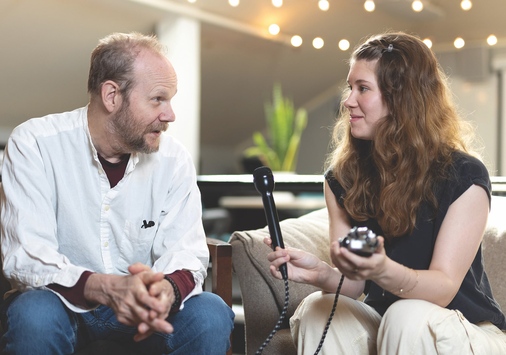
Maggie Messitt, Journalism’s “Writing-in-Place” Andrew W. Mellon Foundation Grant Fellow, has spent her first few months at Denison working with faculty across disciplines to find new ways to integrate Journalism across their curriculum. In the spring, Messitt will be leading a class of faculty who are interested in adapting existing curriculum to include journalism or writing for broadening audiences generally.
“In the beginning, I was just talking to faculty across the university. From math to hard sciences to the humanities. I’ve been joking that I’ve been wooing them to date me,” she laughs. “But, in some ways, it’s really like evangelizing narrative journalism, using a journalist’s skills to sit and listen. That’s the type of journalism I’ve always done. I listen to them talk about their field so I can get a better understanding of where they’re coming from.”
Messitt spent her first six weeks getting to know Denison faculty and building relationships.
“I get to tell professors about other scholars around the country who simultaneously file a narrative piece or personal essay that’s about the scholarly article they’re also submitting for publication. I’m trying to show them that there are other people in their field that are doing this.”
In meeting with faculty to discuss journalism, Messitt tries to help them see how they can use narrative in their own writing and write for broader audiences, whatever form they may take, that tells stories that might only be a line or paragraph in their scholarly articles.
“However, I don’t believe faculty can integrate narrative journalism into their curriculum well, or long-term, if they’re not doing it themselves. Nor do I think they’ll feel super prepared to ask you [their students] to do an assignment that’s journalism if they don’t know how to assess that assignment.”
This fall, Messitt invited faculty to apply to be a part of the new Mellon Journalism faculty cohort. The four selected faculty members will work alongside Messitt throughout the spring and summer months as a group, as well as one-on-one. They will attend her ‘class’ and consider the ways narrative journalism currently exists in their different fields of study. The faculty are expected to work with Messitt on a piece of their own writing, from pitch to publication. The second requirement of Messitt’s ‘class’ is that faculty revise an existing syllabus using the writing and pedagogical tools they’ll learn within the cohort with the aim of including narrative journalism or writing for broader audiences.
“Some of faculty have been really surprised by how important narrative is, inside the classroom and professionally, across most fields. I’m excited for them to see that they too can do this work and, in doing so, their work will reach so many more readers or listeners.” She emphasizes the importance of storytelling and its significance in all fields (medicine, law, anthropology, etc.) “Really good storytelling is about taking those things that we ‘nerd out’ about and find ways to make everyone else excited about it.”
Faculty from across the university applied to the cohort, and the following four were selected to begin work with Messitt in January: Karen Graves (Education), Heather Rhodes (Neuroscience), Taku Suzuki (International Studies / Anthropology), and Andrea Ziegert (Economics).
In September, Messitt also presented “Art(i)fact: One Story, Seven Ways,” as part of Denison’s Tuesday Faculty Lunch Series where she shared the multiple ways she is working with a single narrative—a single missing person’s case—from a book-length narrative and a series of articles to a choose-your-own adventure application that allows readers to explore primary sources and fieldnotes to her collaboration with a fine art photographer. Throughout, she stressed the importance of patience in her work, “It’s not about finding a story to fit inside your pre-constructed ideas, but letting story unfold.”
Messitt is a journalist, teacher, editor, author, and literary scholar in addition to her time as a Mellon Grant Fellow at Denison. She is the former National Director of Report for America and spent almost a decade as a long-form reporter, newspaper editor, and founding director of a writing school for rural women in South Africa.














